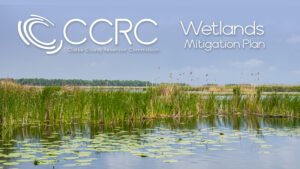
At the June 20th meeting of the Clarke County Reservoir Commission (CCRC), action items were discussed for the next stage of the reservoir’s development. With archeological research and compliance studies making good progress, the CCRC moved to expedite the next stage of the development through action on a Wetlands Compensatory Mitigation Plan required by the Clean Water Act.
Compensatory wetland mitigation is the final step in the process called The Mitigation Sequence which the CCRC and their engineering partners, HDR, Inc., the NRCS, and the Iowa DNR have been working through since spring of 2023. The stages of the mandatory sequence include: 1) evaluation of the impacts of development on area wetlands and the creation of plans to avoid any adverse impact, 2) If such impacts cannot be avoided, developers must set out a plan to minimize their impact on the area, and 3) If there are still unavoidable impacts to the development’s wetlands, the commission and their engineering partners must implement compensatory wetlands mitigation plan that they will then execute in conjunction with the ongoing development.
The Mitigation Sequence is designed to determine the type and level of wetland mitigation required under Section 404 of the Clean Water Act. Wetland mitigation is the compensation of lost acres, functions, and values from a converted wetland through restoration, enhancement, or creation of new wetlands at another location.
“Much of the wetlands within and surrounding the reservoir will be replaced and reconstituted as the reservoir development proceeds,” said Matt Pillard from HDR. “The impacted wetlands – approximately 55 acres – will be offset through restoration or creation of wetlands within the Lower Des Moines River Basin.”
CCRC Project Coordinator, Dave Beck discussed the stages that’d been completed in the wetlands mitigation sequence to date and offered vision for the next phase of data and information gathering by HDR. This information will ultimately determine the best approach for the CCRC’s wetlands mitigation plan.
“The physical data can be pulled through online mapping systems. Planning level designs of the replacement wetlands will be developed by HDR,” said Beck. “The wetland mitigation plan will become part of the overall project plan, eligible for construction funding by NRCS at the same rates as the water supply reservoir.”
Clean Water Act Wetland Mitigation Requirements:
- Implementation of an NRCS approved mitigation plan to replace the wetland functions, values, and acres lost to conversion.
- Mitigation must be completed prior to, or concurrent with, wetland conversion activities in order to remain compliant and be eligible for USDA program participation.
- A minimum (acreage) ratio of 1 to 1 is required. Ratios may increase due to differences in ecosystems, wetland functions, and values that exist between converted and mitigated wetlands.
- Mitigated wetlands require a recorded warranty easement deed, which will be in effect for the duration of time the converted wetland remains in agricultural production.
- NRCS Program participants may also purchase wetland banking credits from an approved mitigation bank to compensate for converted wetlands.
With approval given from the commission, HDR will proceed to the next steps of the plan that include defining more specifically the areas to be developed for wetlands in the mitigation plan. This will be submitted for approval through the NRCS by the Fall of 2024.
“Each step gets us closer to design and ultimately breaking ground for the reservoir,” said CCRC Board Chair, Ty Wheeler. “After the recent drought issues and hard work the community put into water conservation, this comes as good news.”
When the overall project plan has been finalized and submitted for approval, final engineering design will be done. Once dam and reservoir designs are approved, the next step would be sending the construction of the reservoir out to bid. If all goes according to plan, that stage is expected to be reached by the end of 2026.

